Transformational Leadership on Nursing Staff: A Comprehensive Analysis
VerifiedAdded on 2023/06/13
|9
|2063
|390
Essay
AI Summary
This essay examines the impact of transformational leadership on nursing staff within healthcare organizations. It highlights the importance of nursing leaders who can inspire and guide their teams to provide optimal patient care. The essay discusses how transformational leadership, characterized by inspirational motivation, intellectual stimulation, individualized consideration, and idealized influence, fosters teamwork, enhances self-esteem, and motivates nurses to perform at a high level. It also addresses the managerial levels where this leadership style is most crucial, the positive impacts on both nursing staff and the organization, and the negative consequences of its absence. Furthermore, the essay suggests methods for developing transformational leadership skills in nursing managers, emphasizing the importance of workshops, evidence-based learning, and reflection. The conclusion reinforces that transformational leadership is essential for improving job performance, increasing productivity, and ensuring high-quality patient care in the 21st century.
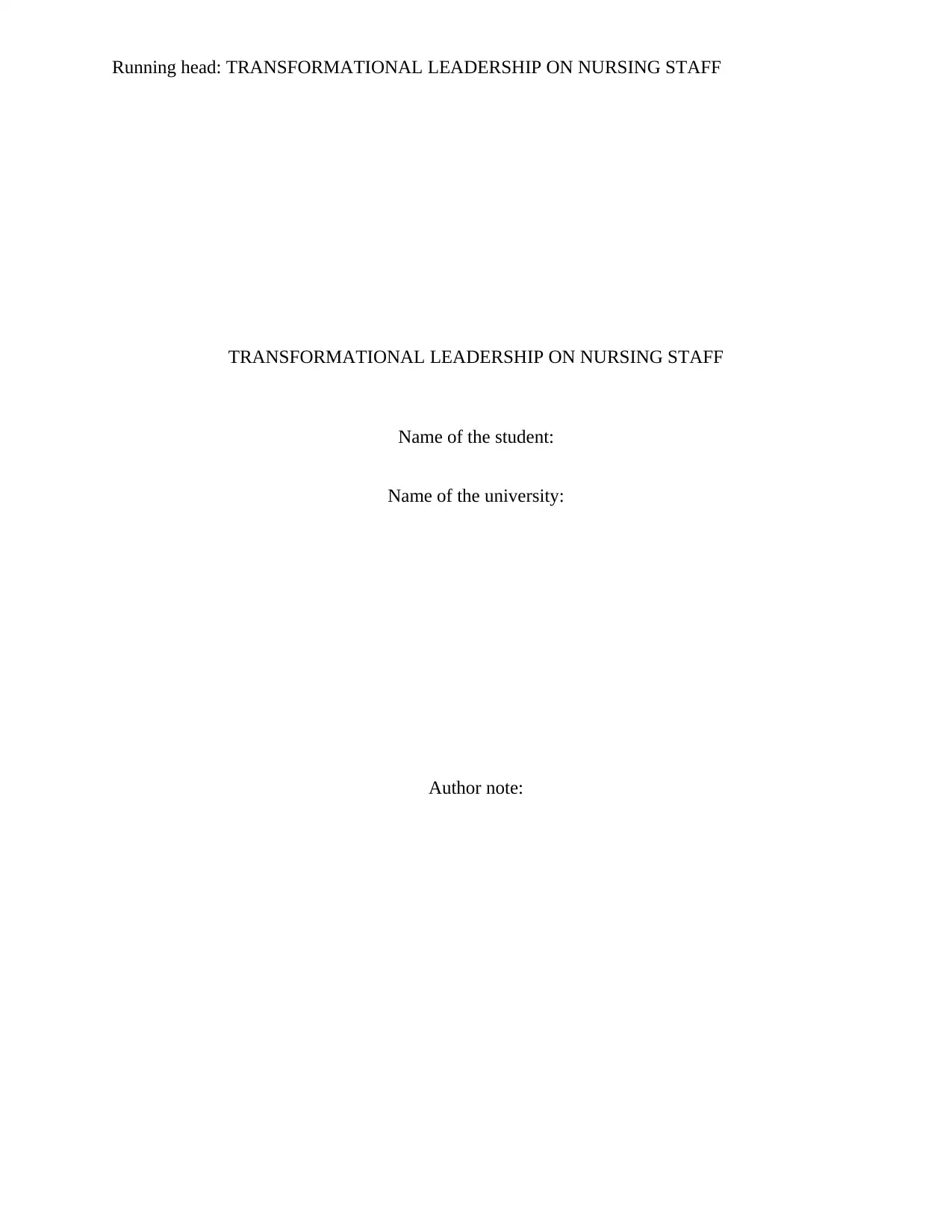
Running head: TRANSFORMATIONAL LEADERSHIP ON NURSING STAFF
TRANSFORMATIONAL LEADERSHIP ON NURSING STAFF
Name of the student:
Name of the university:
Author note:
TRANSFORMATIONAL LEADERSHIP ON NURSING STAFF
Name of the student:
Name of the university:
Author note:
Paraphrase This Document
Need a fresh take? Get an instant paraphrase of this document with our AI Paraphraser
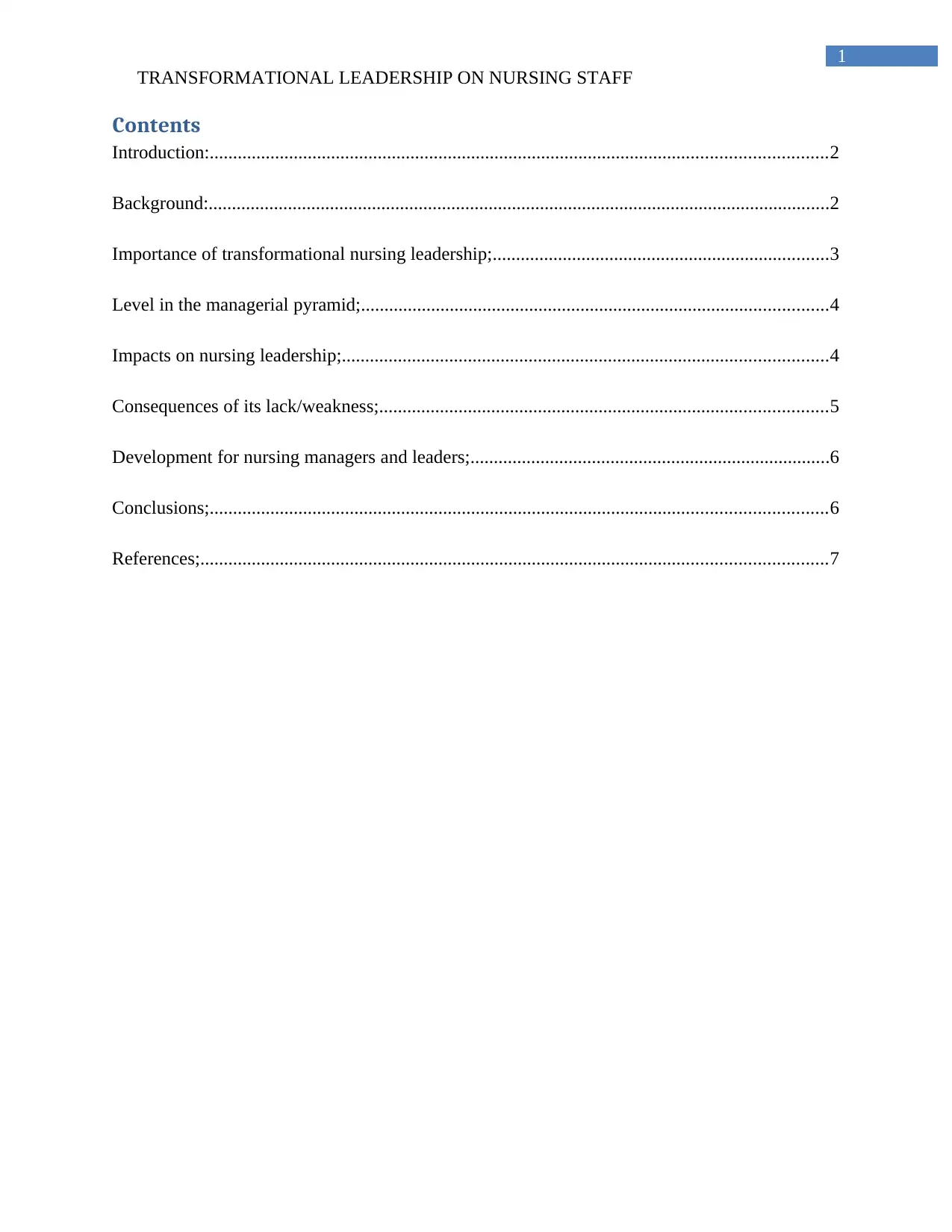
1
TRANSFORMATIONAL LEADERSHIP ON NURSING STAFF
Contents
Introduction:....................................................................................................................................2
Background:.....................................................................................................................................2
Importance of transformational nursing leadership;........................................................................3
Level in the managerial pyramid;....................................................................................................4
Impacts on nursing leadership;........................................................................................................4
Consequences of its lack/weakness;................................................................................................5
Development for nursing managers and leaders;.............................................................................6
Conclusions;....................................................................................................................................6
References;......................................................................................................................................7
TRANSFORMATIONAL LEADERSHIP ON NURSING STAFF
Contents
Introduction:....................................................................................................................................2
Background:.....................................................................................................................................2
Importance of transformational nursing leadership;........................................................................3
Level in the managerial pyramid;....................................................................................................4
Impacts on nursing leadership;........................................................................................................4
Consequences of its lack/weakness;................................................................................................5
Development for nursing managers and leaders;.............................................................................6
Conclusions;....................................................................................................................................6
References;......................................................................................................................................7
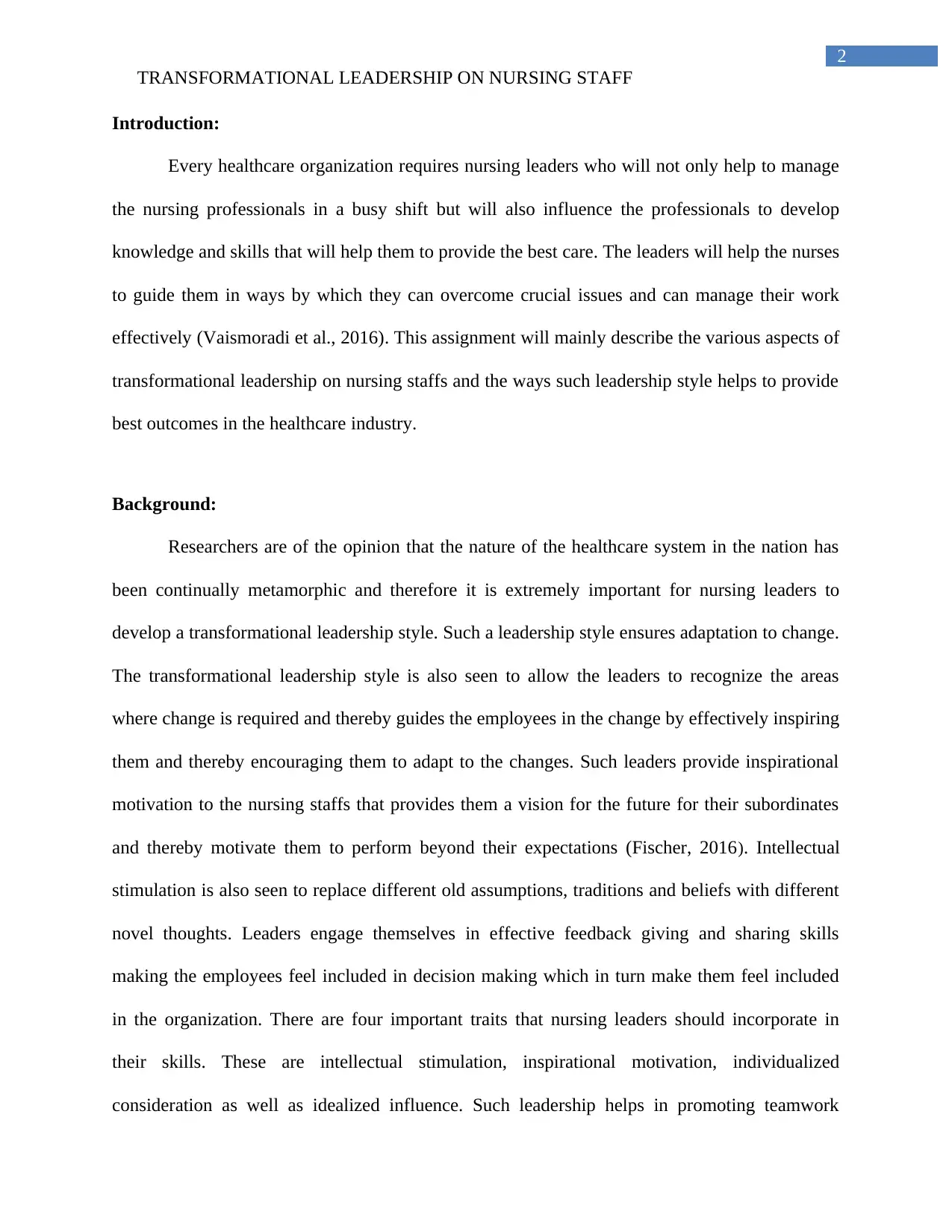
2
TRANSFORMATIONAL LEADERSHIP ON NURSING STAFF
Introduction:
Every healthcare organization requires nursing leaders who will not only help to manage
the nursing professionals in a busy shift but will also influence the professionals to develop
knowledge and skills that will help them to provide the best care. The leaders will help the nurses
to guide them in ways by which they can overcome crucial issues and can manage their work
effectively (Vaismoradi et al., 2016). This assignment will mainly describe the various aspects of
transformational leadership on nursing staffs and the ways such leadership style helps to provide
best outcomes in the healthcare industry.
Background:
Researchers are of the opinion that the nature of the healthcare system in the nation has
been continually metamorphic and therefore it is extremely important for nursing leaders to
develop a transformational leadership style. Such a leadership style ensures adaptation to change.
The transformational leadership style is also seen to allow the leaders to recognize the areas
where change is required and thereby guides the employees in the change by effectively inspiring
them and thereby encouraging them to adapt to the changes. Such leaders provide inspirational
motivation to the nursing staffs that provides them a vision for the future for their subordinates
and thereby motivate them to perform beyond their expectations (Fischer, 2016). Intellectual
stimulation is also seen to replace different old assumptions, traditions and beliefs with different
novel thoughts. Leaders engage themselves in effective feedback giving and sharing skills
making the employees feel included in decision making which in turn make them feel included
in the organization. There are four important traits that nursing leaders should incorporate in
their skills. These are intellectual stimulation, inspirational motivation, individualized
consideration as well as idealized influence. Such leadership helps in promoting teamwork
TRANSFORMATIONAL LEADERSHIP ON NURSING STAFF
Introduction:
Every healthcare organization requires nursing leaders who will not only help to manage
the nursing professionals in a busy shift but will also influence the professionals to develop
knowledge and skills that will help them to provide the best care. The leaders will help the nurses
to guide them in ways by which they can overcome crucial issues and can manage their work
effectively (Vaismoradi et al., 2016). This assignment will mainly describe the various aspects of
transformational leadership on nursing staffs and the ways such leadership style helps to provide
best outcomes in the healthcare industry.
Background:
Researchers are of the opinion that the nature of the healthcare system in the nation has
been continually metamorphic and therefore it is extremely important for nursing leaders to
develop a transformational leadership style. Such a leadership style ensures adaptation to change.
The transformational leadership style is also seen to allow the leaders to recognize the areas
where change is required and thereby guides the employees in the change by effectively inspiring
them and thereby encouraging them to adapt to the changes. Such leaders provide inspirational
motivation to the nursing staffs that provides them a vision for the future for their subordinates
and thereby motivate them to perform beyond their expectations (Fischer, 2016). Intellectual
stimulation is also seen to replace different old assumptions, traditions and beliefs with different
novel thoughts. Leaders engage themselves in effective feedback giving and sharing skills
making the employees feel included in decision making which in turn make them feel included
in the organization. There are four important traits that nursing leaders should incorporate in
their skills. These are intellectual stimulation, inspirational motivation, individualized
consideration as well as idealized influence. Such leadership helps in promoting teamwork
⊘ This is a preview!⊘
Do you want full access?
Subscribe today to unlock all pages.

Trusted by 1+ million students worldwide
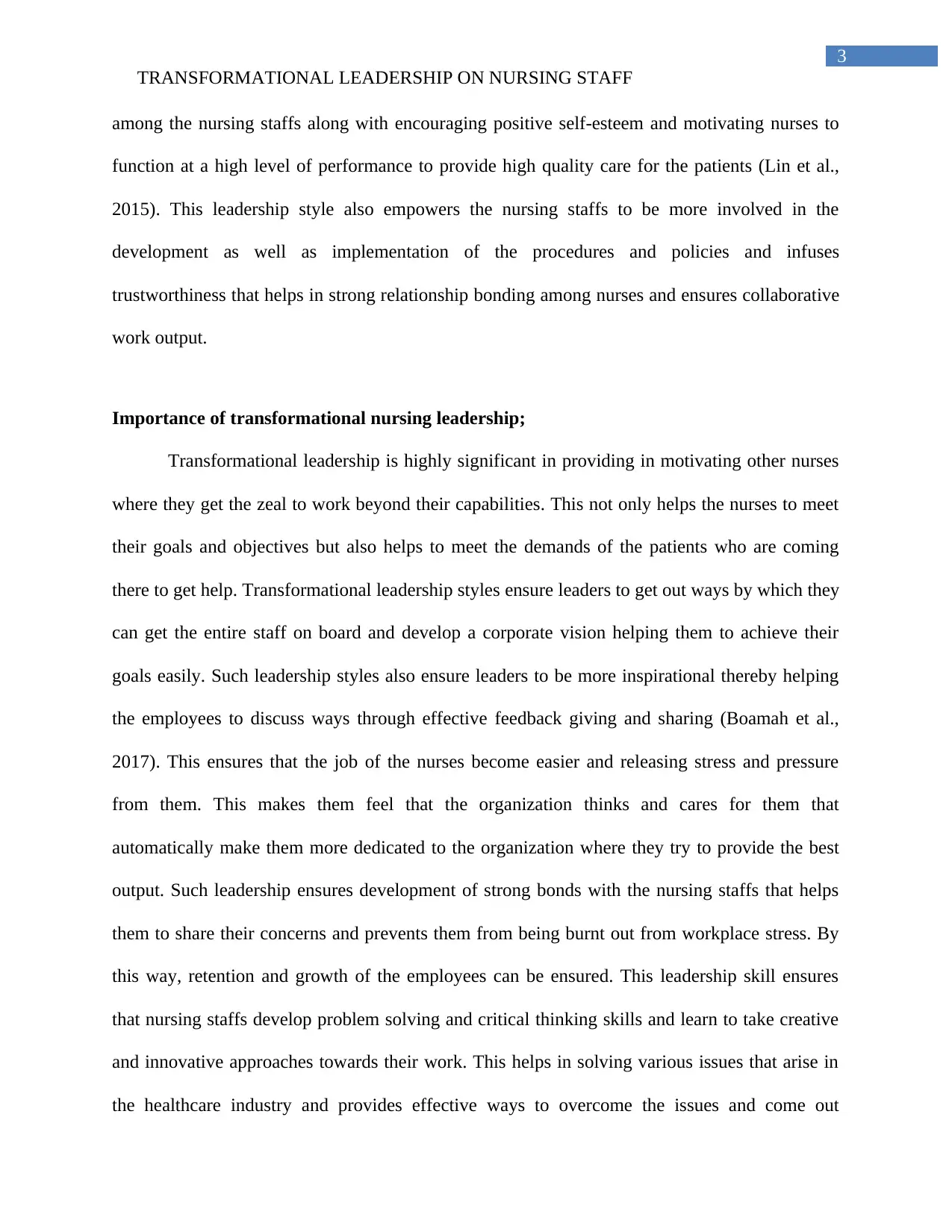
3
TRANSFORMATIONAL LEADERSHIP ON NURSING STAFF
among the nursing staffs along with encouraging positive self-esteem and motivating nurses to
function at a high level of performance to provide high quality care for the patients (Lin et al.,
2015). This leadership style also empowers the nursing staffs to be more involved in the
development as well as implementation of the procedures and policies and infuses
trustworthiness that helps in strong relationship bonding among nurses and ensures collaborative
work output.
Importance of transformational nursing leadership;
Transformational leadership is highly significant in providing in motivating other nurses
where they get the zeal to work beyond their capabilities. This not only helps the nurses to meet
their goals and objectives but also helps to meet the demands of the patients who are coming
there to get help. Transformational leadership styles ensure leaders to get out ways by which they
can get the entire staff on board and develop a corporate vision helping them to achieve their
goals easily. Such leadership styles also ensure leaders to be more inspirational thereby helping
the employees to discuss ways through effective feedback giving and sharing (Boamah et al.,
2017). This ensures that the job of the nurses become easier and releasing stress and pressure
from them. This makes them feel that the organization thinks and cares for them that
automatically make them more dedicated to the organization where they try to provide the best
output. Such leadership ensures development of strong bonds with the nursing staffs that helps
them to share their concerns and prevents them from being burnt out from workplace stress. By
this way, retention and growth of the employees can be ensured. This leadership skill ensures
that nursing staffs develop problem solving and critical thinking skills and learn to take creative
and innovative approaches towards their work. This helps in solving various issues that arise in
the healthcare industry and provides effective ways to overcome the issues and come out
TRANSFORMATIONAL LEADERSHIP ON NURSING STAFF
among the nursing staffs along with encouraging positive self-esteem and motivating nurses to
function at a high level of performance to provide high quality care for the patients (Lin et al.,
2015). This leadership style also empowers the nursing staffs to be more involved in the
development as well as implementation of the procedures and policies and infuses
trustworthiness that helps in strong relationship bonding among nurses and ensures collaborative
work output.
Importance of transformational nursing leadership;
Transformational leadership is highly significant in providing in motivating other nurses
where they get the zeal to work beyond their capabilities. This not only helps the nurses to meet
their goals and objectives but also helps to meet the demands of the patients who are coming
there to get help. Transformational leadership styles ensure leaders to get out ways by which they
can get the entire staff on board and develop a corporate vision helping them to achieve their
goals easily. Such leadership styles also ensure leaders to be more inspirational thereby helping
the employees to discuss ways through effective feedback giving and sharing (Boamah et al.,
2017). This ensures that the job of the nurses become easier and releasing stress and pressure
from them. This makes them feel that the organization thinks and cares for them that
automatically make them more dedicated to the organization where they try to provide the best
output. Such leadership ensures development of strong bonds with the nursing staffs that helps
them to share their concerns and prevents them from being burnt out from workplace stress. By
this way, retention and growth of the employees can be ensured. This leadership skill ensures
that nursing staffs develop problem solving and critical thinking skills and learn to take creative
and innovative approaches towards their work. This helps in solving various issues that arise in
the healthcare industry and provides effective ways to overcome the issues and come out
Paraphrase This Document
Need a fresh take? Get an instant paraphrase of this document with our AI Paraphraser
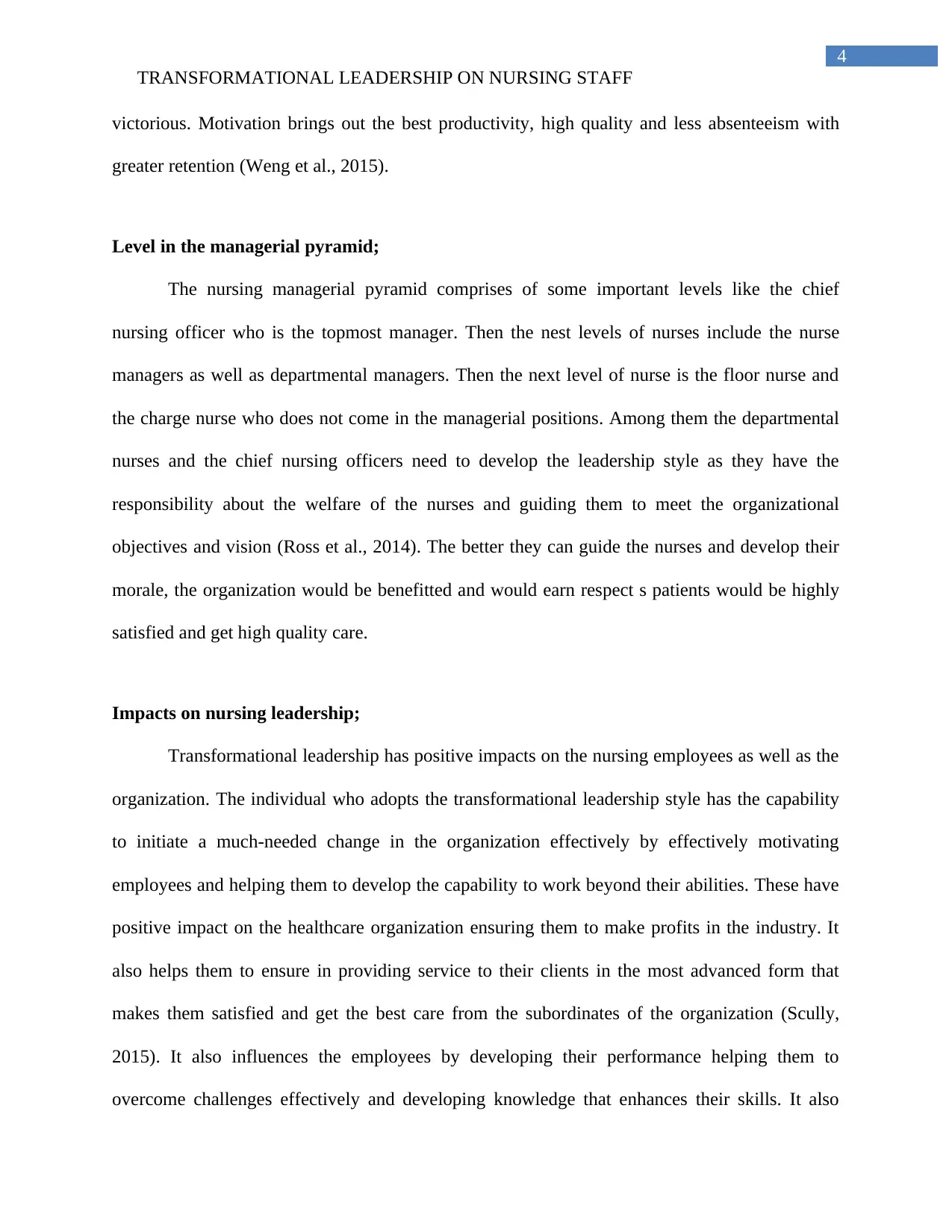
4
TRANSFORMATIONAL LEADERSHIP ON NURSING STAFF
victorious. Motivation brings out the best productivity, high quality and less absenteeism with
greater retention (Weng et al., 2015).
Level in the managerial pyramid;
The nursing managerial pyramid comprises of some important levels like the chief
nursing officer who is the topmost manager. Then the nest levels of nurses include the nurse
managers as well as departmental managers. Then the next level of nurse is the floor nurse and
the charge nurse who does not come in the managerial positions. Among them the departmental
nurses and the chief nursing officers need to develop the leadership style as they have the
responsibility about the welfare of the nurses and guiding them to meet the organizational
objectives and vision (Ross et al., 2014). The better they can guide the nurses and develop their
morale, the organization would be benefitted and would earn respect s patients would be highly
satisfied and get high quality care.
Impacts on nursing leadership;
Transformational leadership has positive impacts on the nursing employees as well as the
organization. The individual who adopts the transformational leadership style has the capability
to initiate a much-needed change in the organization effectively by effectively motivating
employees and helping them to develop the capability to work beyond their abilities. These have
positive impact on the healthcare organization ensuring them to make profits in the industry. It
also helps them to ensure in providing service to their clients in the most advanced form that
makes them satisfied and get the best care from the subordinates of the organization (Scully,
2015). It also influences the employees by developing their performance helping them to
overcome challenges effectively and developing knowledge that enhances their skills. It also
TRANSFORMATIONAL LEADERSHIP ON NURSING STAFF
victorious. Motivation brings out the best productivity, high quality and less absenteeism with
greater retention (Weng et al., 2015).
Level in the managerial pyramid;
The nursing managerial pyramid comprises of some important levels like the chief
nursing officer who is the topmost manager. Then the nest levels of nurses include the nurse
managers as well as departmental managers. Then the next level of nurse is the floor nurse and
the charge nurse who does not come in the managerial positions. Among them the departmental
nurses and the chief nursing officers need to develop the leadership style as they have the
responsibility about the welfare of the nurses and guiding them to meet the organizational
objectives and vision (Ross et al., 2014). The better they can guide the nurses and develop their
morale, the organization would be benefitted and would earn respect s patients would be highly
satisfied and get high quality care.
Impacts on nursing leadership;
Transformational leadership has positive impacts on the nursing employees as well as the
organization. The individual who adopts the transformational leadership style has the capability
to initiate a much-needed change in the organization effectively by effectively motivating
employees and helping them to develop the capability to work beyond their abilities. These have
positive impact on the healthcare organization ensuring them to make profits in the industry. It
also helps them to ensure in providing service to their clients in the most advanced form that
makes them satisfied and get the best care from the subordinates of the organization (Scully,
2015). It also influences the employees by developing their performance helping them to
overcome challenges effectively and developing knowledge that enhances their skills. It also
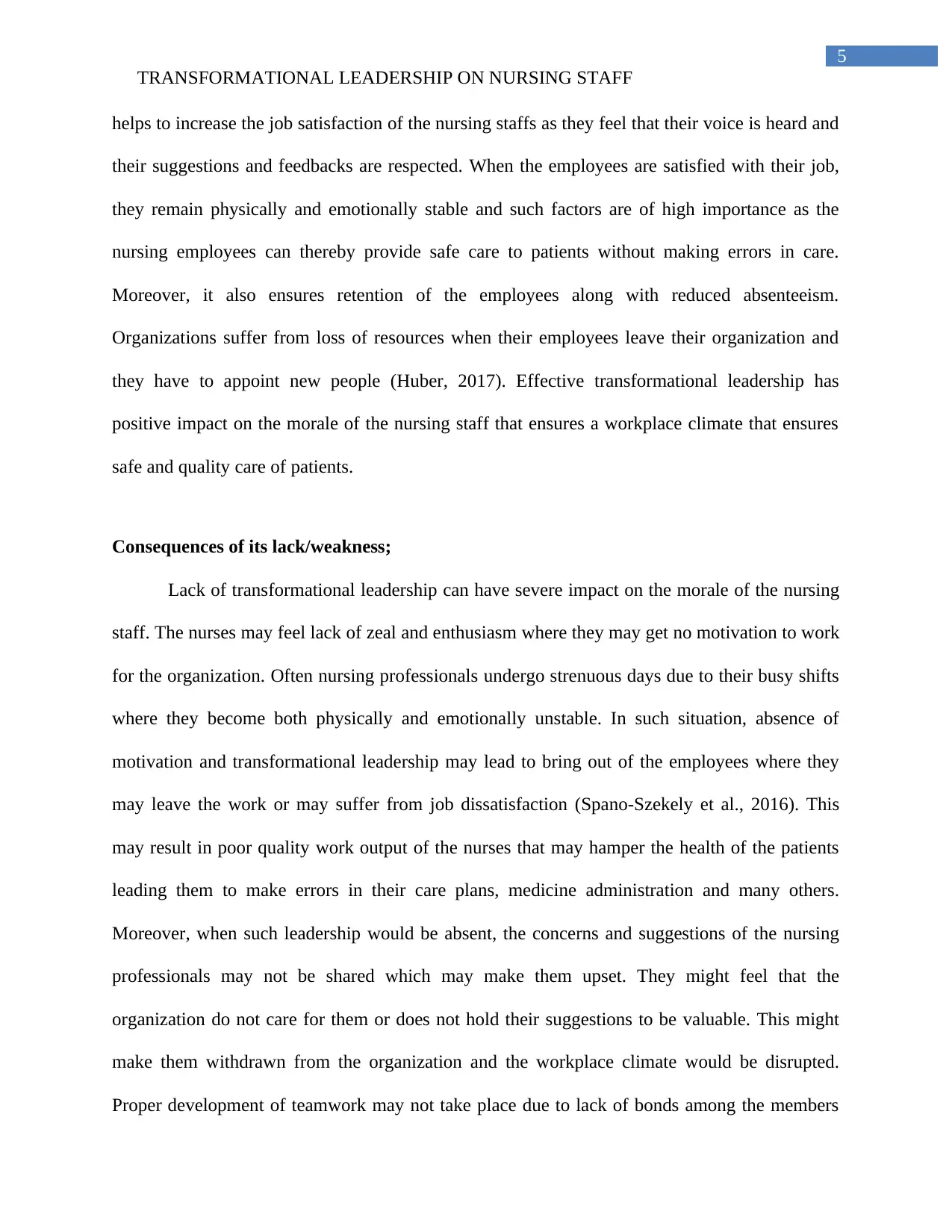
5
TRANSFORMATIONAL LEADERSHIP ON NURSING STAFF
helps to increase the job satisfaction of the nursing staffs as they feel that their voice is heard and
their suggestions and feedbacks are respected. When the employees are satisfied with their job,
they remain physically and emotionally stable and such factors are of high importance as the
nursing employees can thereby provide safe care to patients without making errors in care.
Moreover, it also ensures retention of the employees along with reduced absenteeism.
Organizations suffer from loss of resources when their employees leave their organization and
they have to appoint new people (Huber, 2017). Effective transformational leadership has
positive impact on the morale of the nursing staff that ensures a workplace climate that ensures
safe and quality care of patients.
Consequences of its lack/weakness;
Lack of transformational leadership can have severe impact on the morale of the nursing
staff. The nurses may feel lack of zeal and enthusiasm where they may get no motivation to work
for the organization. Often nursing professionals undergo strenuous days due to their busy shifts
where they become both physically and emotionally unstable. In such situation, absence of
motivation and transformational leadership may lead to bring out of the employees where they
may leave the work or may suffer from job dissatisfaction (Spano-Szekely et al., 2016). This
may result in poor quality work output of the nurses that may hamper the health of the patients
leading them to make errors in their care plans, medicine administration and many others.
Moreover, when such leadership would be absent, the concerns and suggestions of the nursing
professionals may not be shared which may make them upset. They might feel that the
organization do not care for them or does not hold their suggestions to be valuable. This might
make them withdrawn from the organization and the workplace climate would be disrupted.
Proper development of teamwork may not take place due to lack of bonds among the members
TRANSFORMATIONAL LEADERSHIP ON NURSING STAFF
helps to increase the job satisfaction of the nursing staffs as they feel that their voice is heard and
their suggestions and feedbacks are respected. When the employees are satisfied with their job,
they remain physically and emotionally stable and such factors are of high importance as the
nursing employees can thereby provide safe care to patients without making errors in care.
Moreover, it also ensures retention of the employees along with reduced absenteeism.
Organizations suffer from loss of resources when their employees leave their organization and
they have to appoint new people (Huber, 2017). Effective transformational leadership has
positive impact on the morale of the nursing staff that ensures a workplace climate that ensures
safe and quality care of patients.
Consequences of its lack/weakness;
Lack of transformational leadership can have severe impact on the morale of the nursing
staff. The nurses may feel lack of zeal and enthusiasm where they may get no motivation to work
for the organization. Often nursing professionals undergo strenuous days due to their busy shifts
where they become both physically and emotionally unstable. In such situation, absence of
motivation and transformational leadership may lead to bring out of the employees where they
may leave the work or may suffer from job dissatisfaction (Spano-Szekely et al., 2016). This
may result in poor quality work output of the nurses that may hamper the health of the patients
leading them to make errors in their care plans, medicine administration and many others.
Moreover, when such leadership would be absent, the concerns and suggestions of the nursing
professionals may not be shared which may make them upset. They might feel that the
organization do not care for them or does not hold their suggestions to be valuable. This might
make them withdrawn from the organization and the workplace climate would be disrupted.
Proper development of teamwork may not take place due to lack of bonds among the members
⊘ This is a preview!⊘
Do you want full access?
Subscribe today to unlock all pages.

Trusted by 1+ million students worldwide
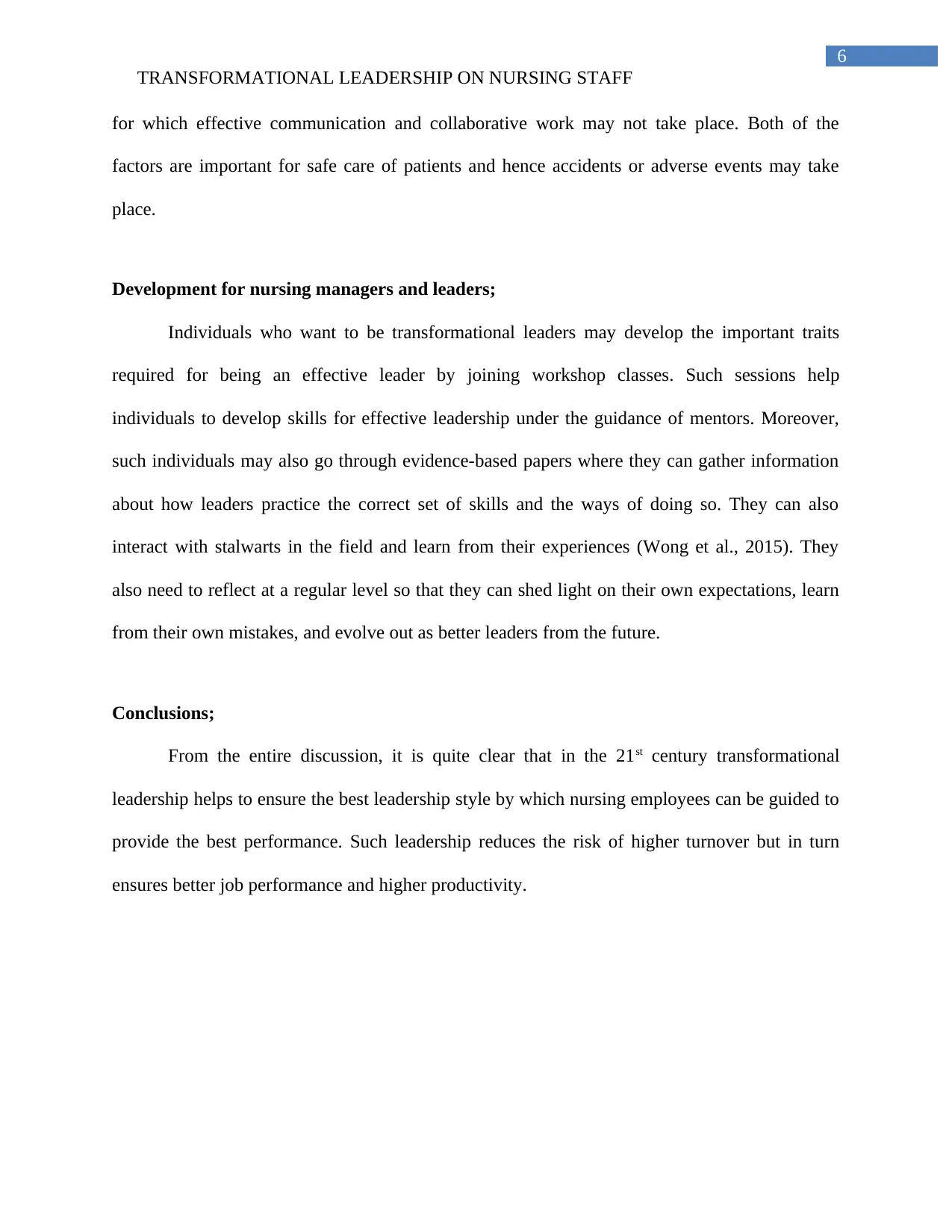
6
TRANSFORMATIONAL LEADERSHIP ON NURSING STAFF
for which effective communication and collaborative work may not take place. Both of the
factors are important for safe care of patients and hence accidents or adverse events may take
place.
Development for nursing managers and leaders;
Individuals who want to be transformational leaders may develop the important traits
required for being an effective leader by joining workshop classes. Such sessions help
individuals to develop skills for effective leadership under the guidance of mentors. Moreover,
such individuals may also go through evidence-based papers where they can gather information
about how leaders practice the correct set of skills and the ways of doing so. They can also
interact with stalwarts in the field and learn from their experiences (Wong et al., 2015). They
also need to reflect at a regular level so that they can shed light on their own expectations, learn
from their own mistakes, and evolve out as better leaders from the future.
Conclusions;
From the entire discussion, it is quite clear that in the 21st century transformational
leadership helps to ensure the best leadership style by which nursing employees can be guided to
provide the best performance. Such leadership reduces the risk of higher turnover but in turn
ensures better job performance and higher productivity.
TRANSFORMATIONAL LEADERSHIP ON NURSING STAFF
for which effective communication and collaborative work may not take place. Both of the
factors are important for safe care of patients and hence accidents or adverse events may take
place.
Development for nursing managers and leaders;
Individuals who want to be transformational leaders may develop the important traits
required for being an effective leader by joining workshop classes. Such sessions help
individuals to develop skills for effective leadership under the guidance of mentors. Moreover,
such individuals may also go through evidence-based papers where they can gather information
about how leaders practice the correct set of skills and the ways of doing so. They can also
interact with stalwarts in the field and learn from their experiences (Wong et al., 2015). They
also need to reflect at a regular level so that they can shed light on their own expectations, learn
from their own mistakes, and evolve out as better leaders from the future.
Conclusions;
From the entire discussion, it is quite clear that in the 21st century transformational
leadership helps to ensure the best leadership style by which nursing employees can be guided to
provide the best performance. Such leadership reduces the risk of higher turnover but in turn
ensures better job performance and higher productivity.
Paraphrase This Document
Need a fresh take? Get an instant paraphrase of this document with our AI Paraphraser
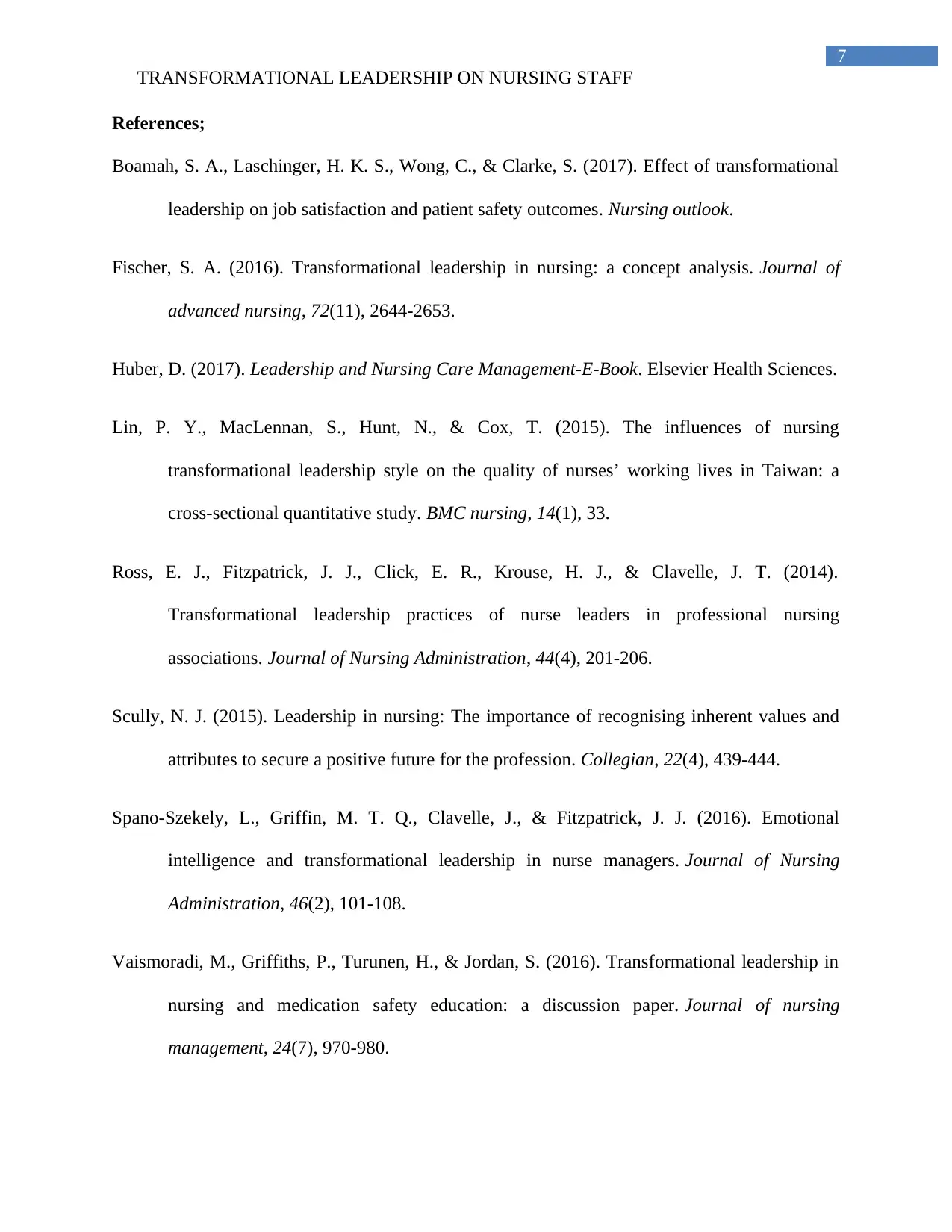
7
TRANSFORMATIONAL LEADERSHIP ON NURSING STAFF
References;
Boamah, S. A., Laschinger, H. K. S., Wong, C., & Clarke, S. (2017). Effect of transformational
leadership on job satisfaction and patient safety outcomes. Nursing outlook.
Fischer, S. A. (2016). Transformational leadership in nursing: a concept analysis. Journal of
advanced nursing, 72(11), 2644-2653.
Huber, D. (2017). Leadership and Nursing Care Management-E-Book. Elsevier Health Sciences.
Lin, P. Y., MacLennan, S., Hunt, N., & Cox, T. (2015). The influences of nursing
transformational leadership style on the quality of nurses’ working lives in Taiwan: a
cross-sectional quantitative study. BMC nursing, 14(1), 33.
Ross, E. J., Fitzpatrick, J. J., Click, E. R., Krouse, H. J., & Clavelle, J. T. (2014).
Transformational leadership practices of nurse leaders in professional nursing
associations. Journal of Nursing Administration, 44(4), 201-206.
Scully, N. J. (2015). Leadership in nursing: The importance of recognising inherent values and
attributes to secure a positive future for the profession. Collegian, 22(4), 439-444.
Spano-Szekely, L., Griffin, M. T. Q., Clavelle, J., & Fitzpatrick, J. J. (2016). Emotional
intelligence and transformational leadership in nurse managers. Journal of Nursing
Administration, 46(2), 101-108.
Vaismoradi, M., Griffiths, P., Turunen, H., & Jordan, S. (2016). Transformational leadership in
nursing and medication safety education: a discussion paper. Journal of nursing
management, 24(7), 970-980.
TRANSFORMATIONAL LEADERSHIP ON NURSING STAFF
References;
Boamah, S. A., Laschinger, H. K. S., Wong, C., & Clarke, S. (2017). Effect of transformational
leadership on job satisfaction and patient safety outcomes. Nursing outlook.
Fischer, S. A. (2016). Transformational leadership in nursing: a concept analysis. Journal of
advanced nursing, 72(11), 2644-2653.
Huber, D. (2017). Leadership and Nursing Care Management-E-Book. Elsevier Health Sciences.
Lin, P. Y., MacLennan, S., Hunt, N., & Cox, T. (2015). The influences of nursing
transformational leadership style on the quality of nurses’ working lives in Taiwan: a
cross-sectional quantitative study. BMC nursing, 14(1), 33.
Ross, E. J., Fitzpatrick, J. J., Click, E. R., Krouse, H. J., & Clavelle, J. T. (2014).
Transformational leadership practices of nurse leaders in professional nursing
associations. Journal of Nursing Administration, 44(4), 201-206.
Scully, N. J. (2015). Leadership in nursing: The importance of recognising inherent values and
attributes to secure a positive future for the profession. Collegian, 22(4), 439-444.
Spano-Szekely, L., Griffin, M. T. Q., Clavelle, J., & Fitzpatrick, J. J. (2016). Emotional
intelligence and transformational leadership in nurse managers. Journal of Nursing
Administration, 46(2), 101-108.
Vaismoradi, M., Griffiths, P., Turunen, H., & Jordan, S. (2016). Transformational leadership in
nursing and medication safety education: a discussion paper. Journal of nursing
management, 24(7), 970-980.
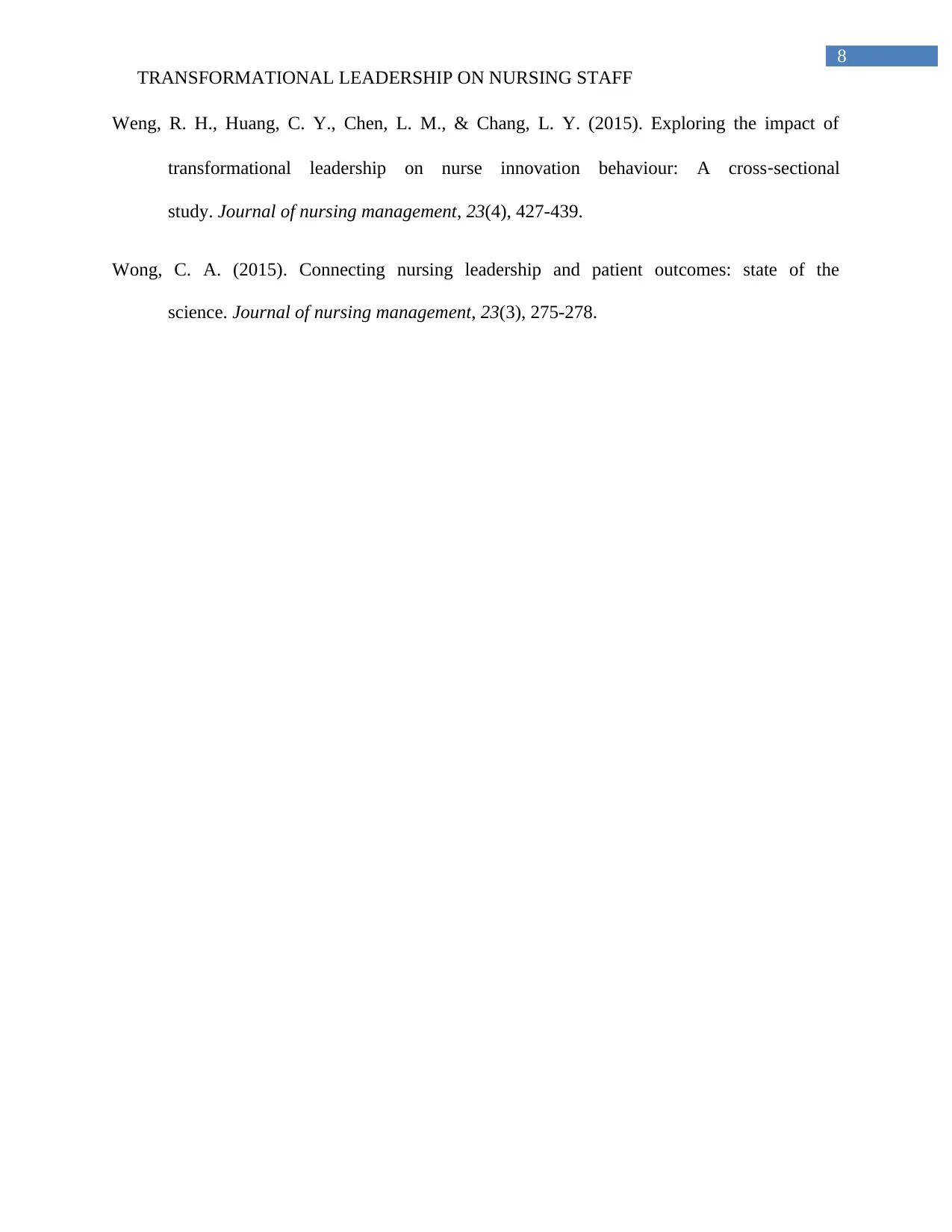
8
TRANSFORMATIONAL LEADERSHIP ON NURSING STAFF
Weng, R. H., Huang, C. Y., Chen, L. M., & Chang, L. Y. (2015). Exploring the impact of
transformational leadership on nurse innovation behaviour: A cross‐sectional
study. Journal of nursing management, 23(4), 427-439.
Wong, C. A. (2015). Connecting nursing leadership and patient outcomes: state of the
science. Journal of nursing management, 23(3), 275-278.
TRANSFORMATIONAL LEADERSHIP ON NURSING STAFF
Weng, R. H., Huang, C. Y., Chen, L. M., & Chang, L. Y. (2015). Exploring the impact of
transformational leadership on nurse innovation behaviour: A cross‐sectional
study. Journal of nursing management, 23(4), 427-439.
Wong, C. A. (2015). Connecting nursing leadership and patient outcomes: state of the
science. Journal of nursing management, 23(3), 275-278.
⊘ This is a preview!⊘
Do you want full access?
Subscribe today to unlock all pages.

Trusted by 1+ million students worldwide
1 out of 9
Related Documents
Your All-in-One AI-Powered Toolkit for Academic Success.
+13062052269
info@desklib.com
Available 24*7 on WhatsApp / Email
![[object Object]](/_next/static/media/star-bottom.7253800d.svg)
Unlock your academic potential
Copyright © 2020–2026 A2Z Services. All Rights Reserved. Developed and managed by ZUCOL.





